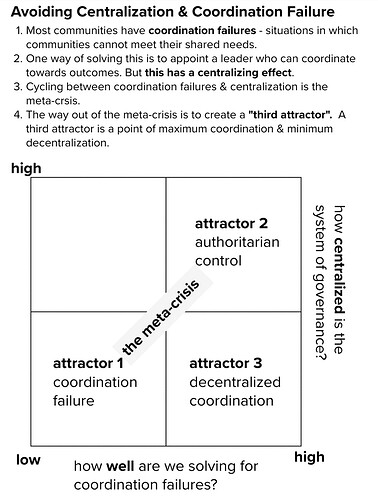I think its interesting to connect the topic of DAO decentralization to the recent Greenpill podcast about the metacrisis I did with Daniel Schmatenberger.
TLDR - The metacrisis is the game theoretic tendancy for systems of humans to tend towards (1) coordination failure. Those who try to coordinate around fixing those coordination failures will tend to (2) centralize control around their coordination. This is the meta-crisis - the tendancy to cycle between coordination failure & centralized control.
In the episode, Daniel says that there is a need for a “third attractor” - basically finding a way to do decentralized coordination.
Here is this idea laid out visually>
Here’s how I think about it with respect to a DAO such as Gitcoin.
By using blockchain-based protocols as the DAO’s underlying assurance mechanism, the DAO can codify organizational governance through code and not purely documented principles that rely on humans to coordinate around. In doing so, we foster greater trust between parties by minimizing trust in people and maximizing trust in technology. (the third attractor)
But before the Grants 2.0 protocols have launched, there is both a risk of centralization (bc the centralized monolith is still being used) and of coordination failure (because coordination is needed to make the protocols successful, and if the protocols are not successful, then the DAO doesnt fully achieve its purpose).
Once the Grants 2.0 protocols have launched + achieved product market fit, then much less coordination is needed in the DAO, so there is much less centralization risk.
Because the protocols will be trustless, they could move the coordination in the DAO from socialware to trustware.
- Socialware - Mechanisms that create assurances through human relationships, incurring a high social coordination cost.
- Trustware - Mechanisms that create assurances through technology, incurring a low social coordination cost.
Once the DAO is completely run on trustware, then it has achieved the “third attractor” of decentralized coordination.
My 002 wei.
